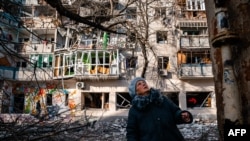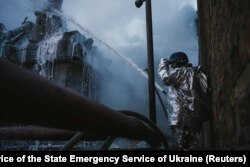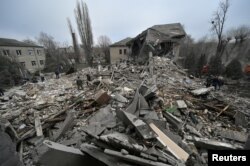In late November, the European Union proposed setting up a United Nations-backed tribunal in response to Russia’s invasion of Ukraine.
Proponents of the move argue that Russia’s war against Ukraine constitutes “an unprecedented act of aggression,” justifying the creation of such a tribunal.
On December 20, Russian Deputy Foreign Minister Sergey Vershinin said the creation of the tribunal without Russia’s participation would be “legal nonsense.”
"These countries, in their Russophobic fervor, are ready to openly violate the U.N. Charter … to interfere in the internal affairs of sovereign states,” Vershinin alleged.
“The European Union, which participates in multi-billion-dollar financing and arms supplies to Ukraine, in this way is trying to cover their own involvement in mass cases of war crimes committed by the Armed Forces of Ukraine.”
Vershinin’s claim is false. It fits into a long-used Russian disinformation tactic called projection —accusing others of doing what you are doing to deflect attention from your actions.
Human rights groups and Ukrainian investigators have documented numerous crimes against civilians and civilian infrastructure allegedly committed by Russia in Ukraine since launching its invasion on February 24.
The United Nations, international monitors, rights groups, and others have accused Russia of indiscriminately shelling and bombing populated areas, killing civilians and destroying hospitals, schools, and residential buildings.
Russian forces are also reported to be systematically targeting Ukraine’s electricity and water supply, depriving Ukrainians of heat, electricity and water “to sow fear and despair” as winter sets in.
The United Nations has also documented repeated attacks on Ukrainian cultural sites.
A recent U.N. report alleged that the Russian armed forces had “summarily executed or carried out attacks on individuals leading to the deaths of hundreds of civilians” in towns and villages across northern Ukraine from February 24 to April 6.
Mass graves and evidence of atrocities have been found in decimated Ukrainian cities from which Russian forces have been forced out.
An Associated Press investigation has largely supported Ukraine’s claims that Moscow has forcibly relocated thousands of Ukrainian children to Russia in a move analysts say could violate the Convention on the Prevention and Punishment of the Crime of Genocide.
Last month, the European Parliament designated Russia a state sponsor of terrorism.
While both sides in the war have reportedly violated international humanitarian law, “Russian armed forces are responsible for the vast majority of the violations identified, including war crimes,” the Independent International Commission of Inquiry on Ukraine, established by the U.N. Human Rights Council, said in October.
It is in this context that Ukraine is defending itself from external aggression, with support from the EU and other allies.
Yes, under international law, EU members could be held responsible for crimes committed with weapons they have transferred to Ukraine if certain conditions are met. But there is no evidence those conditions have been met.
Writing for the Journal of International Humanitarian Legal Studies, Kevin Jon Heller, professor of international law and security at the University of Copenhagen’s Center for Military Studies, and Lena Trabucco, a postdoctoral researcher at the center, outline issues surrounding the legality of weapons transfers to Ukraine under international law.
Heller and Trabucco say, “The shock and horror at Russia’s unprovoked invasion has led many Western states to supply Ukraine with a degree of military support unheard of since the American Lend-Lease Program in 1941.” They add that support to Ukraine “is both morally and politically justified.”
But Western support does entail potential legal pitfalls.
While their analysis focuses on five areas of international law, we’ll go right to the sections relevant to Vershinin’s allegations: that the EU is involved in war crimes by providing billions in military assistance to the armed forces of Ukraine.
Heller and Trabucco reference Common Article 1 of the Geneva Conventions, which “imposes a negative obligation on states to avoid encouraging, aiding, or assisting a specific violation of [International Humanitarian Law] by a party to an armed conflict.”
This negative obligation would prohibit Western states from providing weapons to Ukraine "if there is an expectation, based on facts or knowledge of past patterns, that such weapons would be used to violate the [Geneva] Conventions.”
Heller and Trabucco note that there is no evidence to suggest that Ukrainian armed forces are systematically engaged in war crimes, however, there are credible reports that some units of the Ukrainian military may have committed war crimes. That includes “unlawfully executing Russian prisoners of war near the village of Dmitrovka, west of Kyiv,” and extensively using “cluster munitions in Husarivka while attempting to retake the town.”
Heller and Trabucco argue nothing indicates Western arms delivered since Russia’s invasion were used to commit those alleged war crimes, “or that Ukraine is routinely committing war crimes.”
“It is thus very unlikely that Common Article 1’s negative obligation limits the ability of any Western state to provide Ukraine with a particular type of weapon, much less weapons in general,” they argue.
Heller and Trabucco also cite Article 16 of the Responsibility of States for Internationally Wrongful Acts (ARSIWA), adopted by the U.N. International Law Commission in 2001.
Article 16 covers “aid or assistance in the commission of an internationally wrongful act.”
Under Article 16, a state is “internationally responsible” for committing an internationally wrongful act if it “does so with knowledge of the circumstances of the internationally wrongful act.”
But they argue Article 16 “is less likely to limit the ability of states to continue to provide weapons to Ukraine than Common Article 1,” as it would require that those states knew with “virtual certainty” Ukraine intended to use those arms to commit war crimes.
“Even acknowledging that Ukraine has committed war crimes during its conflict with Russia, the infrequence of their commission means that, at present, Western states can be neither virtually certain that Ukraine intends to commit future war crimes nor virtually certain that Ukraine will commit those crimes with their weapons. Far more persistent and systematic criminality would be required to implicate [Article] 16.”
Heller and Trabucco reference Article 25 of the Rome Statute, the treaty that established the International Criminal Court (ICC).
The ICC’s jurisdiction is limited to the most serious crimes: the crime of genocide; crimes against humanity; war crimes; and the crime of aggression.
Article 25(3)(d) establishes criminal responsibility and liability for punishment for an individual who intentionally contributes “in any other way” to “the commission or attempted commission of such a crime by a group of persons acting with a common purpose.”
Heller and Trabucco then reiterate that there is no evidence Western arms have been involved in Ukrainian war crimes, adding that states “would need to reconsider future plans to provide weapons to Ukraine” if such evidence ever came to light.
If states continued to supply arms after learning previous transfers had “facilitated criminal acts,” the government officials behind the transfers would risk being held criminally responsible under [Article] 25(3)(d) for any war crimes Ukraine used the weapons to commit.”
Meantime, the chief prosecutor of The Hague-based ICC has pushed back against the proposed EU tribunal, arguing the ICC can handle war crimes committed in Ukraine.
But Moscow halted the process of joining the ICC in 2016 (and thus does not recognize the court’s jurisdiction) following an ICC ruling, which recognized Russia’s actions on Ukraine’s Crimean peninsula as an occupation. Russia annexed the peninsula in 2014.
The European Union has proposed establishing either a “special independent international court based on a multilateral treaty, or a specialized court integrated in a national justice system with international judges — a hybrid court,” to hold Russia accountable for its crimes.
An earlier version of this article stated without qualification that Russia has committed war crimes in Ukraine. The article has been amended to reflect that, while copious evidence of such crimes has been collected, none has been proven in a court of law.








